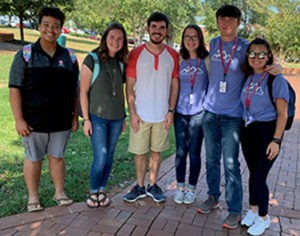NGU Hosts Annual ‘College Day’ for Teacher Cadets
Posted on: March 11, 2021
 Tigerville, SC (November 6, 2019) The annual “College Day” for teacher cadets was held in October. North Greenville University (NGU) hosted more than 150 teacher cadet high school students from Upstate South Carolina on its Tigerville Campus. This year’s “College Day” theme was “Play Day,” from the Teacher Cadet curriculum. The idea showed these students and potential future teachers’ ways that students can learn by playing games.
Tigerville, SC (November 6, 2019) The annual “College Day” for teacher cadets was held in October. North Greenville University (NGU) hosted more than 150 teacher cadet high school students from Upstate South Carolina on its Tigerville Campus. This year’s “College Day” theme was “Play Day,” from the Teacher Cadet curriculum. The idea showed these students and potential future teachers’ ways that students can learn by playing games.
“College Day” allows the high school students to spend a day on the campus of a college or university that sponsors their high school so they can experience college life. NGU partners with eight high schools in the area: Berea, Blue Ridge, Eastside, Greer Middle College Charter, Pickens, Riverside, Traveler’s Rest, and Wade Hampton.
“Play Day” at NGU consisted of two game areas; an inside area and an outside area. Inside games had students in groups playing various board games, and other inside game activities. Outside games included group relay races along with other team-building activities. The teacher cadets were also given campus tours by admissions representatives and a session that was presented by the NGU admissions office to provide the students with information about college life.
“We always hope that many of these teacher cadet students will decide to attend NGU,” said NGU Chair of the Department of Secondary Education Andy Hodges. “This year’s day was very successful. Many of the students responded that they had a great day on campus and enjoyed the activities.”
The Teacher Cadet program, under the sponsorship of the Center for Education Recruitment, Retention, and Advancement (CERRA) and the South Carolina Department of Education, is a dual credit and advanced placement course offered in South Carolina high schools. The course is comparable to the introduction to education college course. The primary goal of the program is to encourage academically talented, high-achieving, high school students with exemplary interpersonal and leadership skills to consider teaching as a career. Students learn about how the educational system works and have field placements in public schools near their high schools.
The curriculum and field experiences are designed to allow high school students to experience public education. Some will go on to college and universities to major in education and become teachers. Others, who go to college and major in other fields of study, will be better-informed citizens about the world of public school education.
The Teacher Cadet program started in South Carolina and to date, 32 other states have adopted this program as their model for allowing high school students to learn and experience education and teaching.
The CERRA website says that its program, “is the oldest and most established teacher recruitment program in the country. The Center for Educator Recruitment, Retention, and Advancement was established by the Commission on Higher Education in December 1985 and is funded by the South Carolina General Assembly. Following the passage of the state’s landmark Education Improvement Act, CERRA was created out of a concern for the condition of South Carolina’s teacher supply pool and a need for a centralized teacher recruitment effort. CERRA pursues a variety of programs for increasing the number of students in the education pipeline and recruiting and retaining qualified, caring, and competent teachers. The Center’s primary target groups are middle and high school students, college students, and adults interested in changing careers.”
For information about NGU’s College of Education and its degree programs, visit the College of Education webpage.
Photo: From left: NGU students with Teacher Cadets from Upstate high schools on “College Day.”




